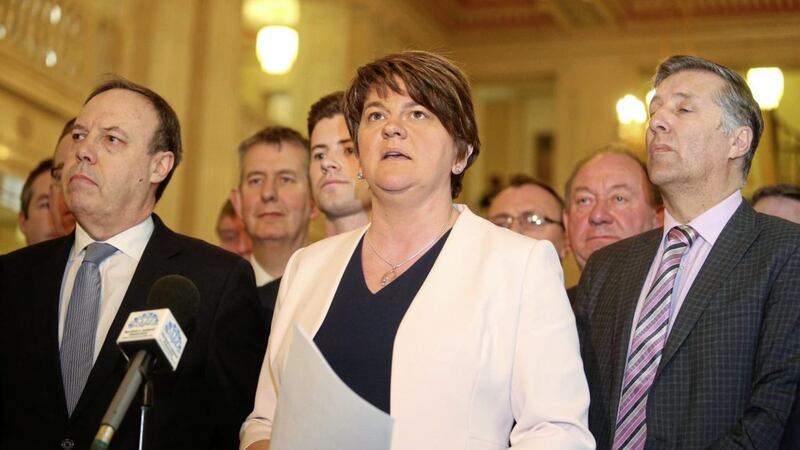I’m a little confused. (“What, even more confused than usual, Alex?” as I’m sure lots of you are now shouting). And the source of my confusion is Sinn Féin’s approach to the latest round of talks.
If, as they insist, they’re sticking to the position that they won’t accept Arlene Foster as first minister until the RHI investigation has concluded—a process which could take months—then it’s going to be very difficult to persuade the DUP to cut a deal with them on anything else. Let’s face it, why would Foster give her imprimatur to compromises on Irish language, legacy and ‘respect,’ if Sinn Féin wouldn’t give her the nod to return as first minister?
Sinn Féin has a number of options at the moment. It may be the case that they think they can get enough ‘progress’ from the DUP and British government over the next few weeks to sell to their base as a major breakthrough. Enough, in other words, to agree to Foster’s immediate return as first minister; albeit with the proviso that she would first acknowledge that she would be ‘toast’ if the RHI investigation didn’t exonerate her further down the line.
Or, maybe they really do want a second election. On March 2 they had their best ever result since they began contesting elections again in 1981/82 and they may reckon that they can squeeze the extra votes and seats required to eclipse the DUP. They’re certainly working very hard on voter registration. It’s a risky strategy, though: yes, they might add on votes, but it’s also possible that unionism—rattled by March 2—might rally around Foster just to give two electoral fingers to Gerry Adams. Anyway, while SF will go through the motions of taking part in the talks process, they may have already made the decision that they’d prefer the election.
Another key calculation for them is this: if the DUP faced a stark choice between sacrificing Foster as First Minister (and the longer she has to stand aside, the harder it will be for her to come back) in return for restoring devolution; or entering a long, potentially very long period of direct rule, which would they choose? I put that very question to a DUP friend last week and he responded with a shrug of the shoulders and a pained smile.
On the other hand, they may already have moved beyond the existing institutions. I argued here, in January, that SF might have concluded that the executive/assembly had run their course in terms of usefulness to the unity agenda and that they had more to gain from the British and Irish governments taking over the process. Martin McGuinness’s final political act was to crash the process. He knew what he was doing. He knew that restoring them would be extraordinarily difficult. He knew, I suspect, that they might not be restored.
As is so often the case, it’s very difficult to know which of these options—and there are others, of course—has been prioritised by Gerry Adams. Each of them has its attractions and each of them causes problems for the DUP. Putting it bluntly: what price is the DUP willing to pay to restore devolution and what price is it willing to pay to stop Arlene Foster having to stand aside as first minister? It was under her watch that unionism lost its overall majority in a local parliament/assembly. Will it be under her watch that the DUP loses the very institutions they have championed since 2007? How confident can they be that a second election under her leadership will repair the damage done on March 2?
A fortnight before Ian Paisley was toppled as DUP leader and first minister (the grassroots shaken by the ‘Chuckle Brothers’ relationship) a DUP MLA told me; “The party agenda and base is much more important than the leader’s opinion and position at this stage.” Hmm. Many of the key people who made the call on Paisley are still there.
Sinn Féin can do without the assembly and executive. I’m not sure that the same can be said of the DUP. Both direct rule and de facto joint authority will weaken the DUP; and that weakening won’t be mitigated by the influence (never as important as they would have us believe) of their eight MPs. David Trimble and the UUP were irreparably damaged by the perception that they had been outplayed by SF; and the DUP was able to take electoral/political advantage of that perception. The DUP hasn’t yet been outplayed, but it has been outmanoeuvred and it is unsettled and in uncharted waters. And since the departure of Peter Robinson—who controlled every part of the party—there hasn’t been the sureness of touch in terms of media handling and strategy.
The DUP looks uncomfortable and on the back foot at the moment. It is not used to being in this position. The next few weeks will test Foster as she has never been tested before. The outcome will make or break her.








